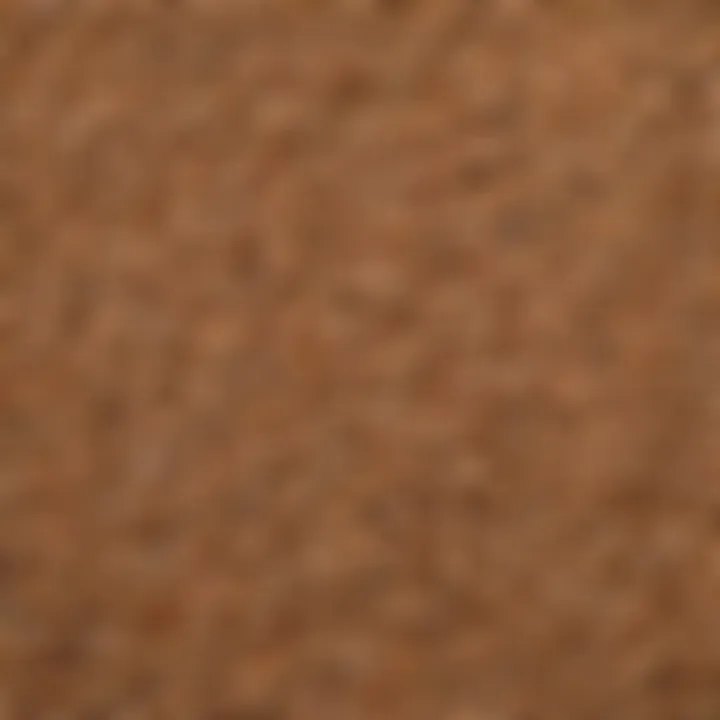Nourishment From Within: Enhance Your Beauty Naturally


Intro
Nourishing one's body is a path to improve not only overall health but also the appearance of hair, skin, and nails. This section will delve into the importance of nutrition and its direct impact on beauty, emphasizing how the food choices we make can foster vibrant, healthy hair, glowing skin, and strong nails. While many might seek topical solutions in the beauty aisle, the foundation often lies in the nutritional value of the foods we consume daily. With a well-informed approach to diet, individuals can take significant steps toward enhancing their appearance from within.
Wellness
Nutrition and Diet
The foods we eat are composed of nutrients that play specific roles in maintaining and optimizing skin, hair, and nail health. Key components like vitamins A, C, D, and E, alongside minerals such as zinc and iron, are pivotal. Each of these nutrients helps to create an inviting environment for growth and repair.
Foods such as salmon, which is rich in omega-3 fatty acids, not only enhance hair follicle health but also promote elasticity in skin, reducing dryness. Similarly, leafy greens, which are abundant in vitamins and antioxidants, support cellular regeneration, actively combating the signs of aging.
Important Nutrients for Beauty
- Omega-3 Fatty Acids: Found in fish like salmon and walnuts, they provide essential fats for moisture and shine.
- Vitamin C: Present in citrus fruits, it aids collagen production, playing a crucial role in skin strength.
- Biotin: Found in eggs and nuts, it fosters nail strength and hair growth.
"The foundation of beauty radiates from a well-balanced diet, not just from external applications."
Physical Health
A holistic approach to nutrition not only benefits appearance but reinforces physical health. A diet littered with processed foods can lead to deficient nutrient intake, which detrimentally affects hair, skin, and nails. Maintaining a healthy digestive system is also essential, as it facilitates nutrient absorption.
Mental Health
Furthermore, nutrition is closely linked to mental health. Research indicates that certain diets can improve mood and reduce stress levels. Lower stress can minimize occurrences of hair loss and skin issues, such as acne or eczema. Including whole foods and minimally processed options can simplify the journey to both physical and mental wellness.
Fitness and Exercise
In tandem with nutrition, regular physical activity enhances circulation, which is invaluable for skin clarity and hair growth. Exercise helps oxygenate the blood, delivering vital nutrients to skin and hair follicles. Simple changes, like incorporating short sessions of brisk walking or yoga, can reap significant benefits.
At this point, it is clear that the synergy between nutrition, physical health, and mental well-being creates a comprehensive framework for enhancing beauty from within. The goal is to empower individuals with knowledge about sustaining a diet that uplifts both health and appearance. Proper nourishment is a step towards a revitalized version of oneself.
Prelude to Nutritional Beauty
The pursuit of beauty often leads individuals to cosmetic trends and products, yet the foundation begins within the body itself. Nutritional beauty emphasizes the idea that what we consume directly affects the health of our hair, skin, and nails. This concept is not merely a fashion statement; it is rooted in scientific understanding of how essential nutrients play a critical role in bodily functions.
Foods rich in vitamins, minerals, healthy fats, and proteins do more than nourish the body; they can enhance physical appearance and overall well-being. By understanding the connection between diet and beauty, people can make informed choices that contribute to healthier, more radiant hair, skin, and nails.
For example, a diet deficient in essential nutrients may lead to dull hair, brittle nails, and skin that lacks vitality. Conversely, incorporating nutrient-dense foods can maintain and improve these physical traits, leading to a more youthful appearance. This article will explore the various nutrients and food sources that are vital for promoting beauty from within, establishing a link between nourishment and radiance.
In exploring nutritional beauty, we will consider several aspects:
- The role of proteins and amino acids in hair reconstruction.
- How vitamins A, C, D, and E act as skin enhancers.
- The importance of minerals like zinc and iron in nail health.
As these factors are elaborated upon, it will become evident that the pathway to beauty is not solely about external treatments, but rather begins with the food choices a person makes. Not only does understanding this relationship empower individuals to improve their beauty regimen, but it also encourages a holistic approach to health. Embracing this mindset can lead to long-lasting results that reflect both externally and internally.
The Importance of Nutrition for Hair, Skin, and Nails
Nutrition plays a critical role in the health of our hair, skin, and nails. The body requires a variety of vitamins, minerals, and other nutrients to support these structures. Deficiencies in these essential components can lead to weakness, dullness, and other issues. Understanding the importance of nutrition is vital for anyone looking to enhance their natural beauty.
Hair is primarily made of a protein called keratin. Thus, adequate protein intake is necessary for maintaining healthy hair. Foods rich in proteins like lean meats, beans, and dairy provide the building blocks for hair structure. If protein levels are low, hair may become brittle and fall out.
Skin is the body’s largest organ and is often the first to show signs of inadequate nutrition. Vitamins, such as A, C, D, and E, are essential for skin repair and protection. For example, Vitamin C supports collagen production, which helps in maintaining skin elasticity. In contrast, unhealthy skin can lead to other complications and lower self-esteem.
Nails, while often overlooked, also require proper nourishment. They are made of keratin and grow from the nail matrix, which needs a range of nutrients for optimal health. Biotin, a B vitamin, is particularly important for nail strength. Without sufficient biotin intake, nails may become weak and prone to breaking.
"What we consume directly impacts our physical appearance and overall well-being."
Increased awareness of dietary choices is essential for those looking to improve their hair, skin, and nails. Incorporating a wide variety of foods into the diet may help ensure that one receives all the necessary nutrients. For instance, a well-balanced diet rich in fruits, vegetables, whole grains, and lean proteins can provide a robust upkeep for these features. Meanwhile, a deficit in these areas can have negative consequences.


Moreover, hydration is often an underrated component of nutrition. Drinking enough water aids in keeping the skin supple and the nails hydrated. Dehydration can lead to dry skin and brittle nails, making moisture a key player in nutrition.
In summary, the connection between nutrition and the health of hair, skin, and nails is significant. By understanding the specific needs of each area, individuals can make informed decisions to promote their overall beauty from within.
Essential Nutrients for Optimal Hair Health
Hair health relies heavily on specific nutrients. These nutrients help maintain the structure and strength of hair. As people seek to improve their hair, recognizing which nutrients are critical can guide dietary choices. Essential nutrients work synergistically to enhance hair health, providing the necessary building blocks for growth and resilience. The right intake can lead to visibly stronger, shinier, and healthier hair, which aligns with broader beauty goals.
Proteins and Amino Acids
Proteins are fundamental for hair. Hair is primarily made of a protein called keratin. Consuming adequate protein helps in the formation of keratin, which directly impacts hair strength and texture. Amino acids, the building blocks of proteins, play a crucial role in this process.
Key amino acids such as cysteine and methionine are particularly beneficial. Cysteine helps to stabilize keratin structure, while methionine offers sulfur, a vital mineral that contributes to hair health. Sources of protein like chicken, fish, beans, and lentils can support the body's protein needs. Inadequate protein intake may lead to weak hair, hair loss, or slow growth.
Vitamins A, , , and E
Vitamins have various functions in maintaining hair health. Vitamin A, for instance, helps with the production of sebum, an oily substance that keeps hair hydrated. It also promotes cell growth, ensuring healthy scalp conditions. Vitamin C is an antioxidant that protects hair follicles from damage. This vitamin also aids in collagen production, a protein essential for hair strength.
Vitamin D plays a unique role. It is essential for creating new hair follicles, contributing to hair growth. Lastly, vitamin E enhances blood circulation in the scalp, leading to better nutrient absorption. Foods rich in these vitamins include leafy greens, citrus fruits, fatty fish, and nuts.
Minerals: Zinc and Iron
Minerals are as critical as vitamins for hair health. Zinc aids in tissue growth and repair. It also keeps hormone levels balanced, which is essential for hair growth. A deficiency in zinc may lead to hair shedding and an overall unhealthy appearance.
Iron is another important mineral. It helps with oxygen transport in the bloodstream, ensuring that hair follicles receive the necessary oxygen and nutrients to thrive. Iron-rich foods, such as red meat, spinach, and legumes, can help maintain healthy iron levels. A lack of iron often results in hair thinning and brittleness.
"A balanced diet rich in essential nutrients is vital for promoting hair vitality."
In summary, focusing on proteins, vitamins, and minerals allows individuals to take proactive steps toward improving their hair health. These nutrients serve as a foundation that enhances hair's appearance and resilience. By prioritizing these elements in daily meals, one can work toward achieving better hair health.
Nutritional Factors Impacting Skin Quality
The quality of skin is significantly influenced by various nutritional factors. This section delves into key elements that nourish the skin and enhance its appearance. Understanding these factors helps individuals make informed dietary choices that can lead to healthier skin. A combination of antioxidants, proper hydration, and essential fatty acids work synergistically to combat signs of aging, promote elasticity, and maintain a radiant glow.
The Role of Antioxidants
Antioxidants play a crucial role in skin health by combating oxidative stress. Free radicals can damage skin cells, leading to premature aging, wrinkles, and dullness. Consuming foods rich in antioxidants helps neutralize these harmful agents.
Key sources of antioxidants include:
- Berries (such as blueberries and strawberries)
- Dark leafy greens (like spinach and kale)
- Nuts (particularly walnuts and pecans)
- Dark chocolate, which contains flavonoids
- Green tea, known for its catechins
Incorporating these foods into one's diet can provide the necessary protection against environmental damage, supporting not only skin health but overall well-being.
Hydration and Water Intake
Proper hydration is fundamental for skin quality. Water helps maintain skin elasticity and moisture. Dehydrated skin can appear dry, flaky, and more prone to wrinkles.
Consuming adequate water daily is essential. The general guidelines suggest:
- Drink at least eight 8-ounce glasses of water daily
- Increase intake during hot weather or after intense physical activity
- Include hydrating foods such as cucumbers, oranges, and watermelons
Additionally, reducing alcohol and caffeine can also support hydration levels. A well-hydrated body reflects positively on skin quality, providing a healthy and youthful appearance.
Essential Fatty Acids
Essential fatty acids are critical for maintaining the skin’s barrier, reducing inflammation, and promoting optimal hydration. Omega-3 and Omega-6 fatty acids are particularly beneficial.
Sources of these fatty acids include:


- Fatty fish like salmon, mackerel, and sardines
- Chia seeds and flaxseeds
- Walnuts
- Canola oil
Research suggests that diets rich in these fatty acids can improve skin conditions such as eczema and psoriasis. They contribute to a plump appearance and enhance overall skin texture. Incorporating these foods into weekly meal plans can foster more resilient skin and support its natural functions.
In summary, a diet rich in antioxidants, proper hydration, and essential fatty acids is vital for skin vitality.
Key Foods for Promoting Hair Vitality
The relationship between food and hair health is crucial. Proper nutrition is fundamental for strong and vibrant hair. Specific foods provide essential nutrients that can enhance hair vitality, reduce hair loss, and promote overall scalp health. When one invests in high-quality nutrition, the benefits extend beyond aesthetics, reaching deeper into the realms of health.
Fatty Fish and Omega-3 Sources
Fatty fish such as salmon, mackerel, and sardines are excellent sources of omega-3 fatty acids. These essential fats support hair health by nourishing the hair follicles and promoting a healthy scalp. Omega-3s can also aid in reducing inflammation, which is linked to hair loss. Furthermore, incorporating fatty fish into the diet can help maintain scalp hydration, giving the hair a lustrous appearance. If fatty fish is not part of your diet, alternatives like flaxseeds and walnuts can provide similar benefits, ensuring your omega-3 intake stays sufficient.
Nuts and Seeds
Nuts and seeds, such as walnuts, almonds, and sunflower seeds, are vital for nourishing hair. They are rich in vitamin E and biotin, both of which are essential for hair growth and strength. Vitamin E protects the scalp from oxidative stress, while biotin is crucial for keratin production, a key structural protein in hair. Additionally, the zinc found in pumpkin seeds helps prevent hair shedding. These snacks not only serve as an accessible source of nutrients, but they also contribute to a balanced diet that can enhance overall beauty.
Eggs and Dairy Products
Eggs and dairy products are excellent sources of protein, which is needed for hair strength. Hair is primarily made up of a protein called keratin, so consuming sufficient protein plays an important role in hair vitality. Eggs contain not only protein but also biotin and B vitamins, supporting overall hair health. Dairy products like yogurt and cheese are also protein-rich and provide calcium and other nutrients like vitamin D, which can further improve hair quality. Choosing high-quality sources of these foods can promote stronger hair and enhance its natural shine.
Foods That Enhance Skin Appearance
The appearance of skin is often seen as a reflection of one’s overall health and well-being. Thus, it is crucial to understand the role of certain foods in promoting skin health. By integrating specific nutrients into the diet, individuals can enhance their skin’s texture, moisture retention, and elasticity. The importance of foods that enhance skin appearance lies in their capacity to provide essential vitamins, minerals, and other compounds that support skin regeneration and protection.
Fruits and Vegetables
Fruits and vegetables are cornerstone elements of a diet aimed at improving skin appearance. They are rich in vitamins, minerals, and antioxidants, which combat oxidative stress and inflammation. Vitamin C, for instance, is abundant in citrus fruits, berries, and leafy greens. This vitamin is vital for collagen production, a protein that maintains skin structure and elasticity.
Many fruits and vegetables also contain carotenoids, such as beta-carotene, which can lend a healthy glow to the skin. Carrots, sweet potatoes, and spinach are good sources of carotenoids. Regular consumption can lead to improved skin tone and texture. Moreover, the high water content in fruits and vegetables like cucumbers and watermelon helps with hydration, promoting a plump appearance.
"Eating a variety of colors from fruits and vegetables ensures a broad intake of beneficial nutrients."
Incorporating a diverse range of these foods into meals is practical. Preparing salads, smoothies, or simply snacking on fresh produce can make skin-enhancing nutrients more accessible.
Whole Grains
Whole grains play an essential role in skin health as they provide sustained energy and nutrients that are important for skin cell regeneration. Foods such as brown rice, quinoa, and whole wheat bread are high in fiber and B vitamins, including niacin and riboflavin. These vitamins support skin barrier function, which is crucial for maintaining hydration and elasticity.
Additionally, the antioxidants present in whole grains help to mitigate the effects of free radicals, which can damage skin cells and accelerate the aging process. Including whole grains in meals ensures a balanced approach to nutrition, complementing other dietary components for overall skin vitality. Opting for whole grains instead of refined grains can lead to improved skin texture and a reduction in skin irritations.
Probiotic-Rich Foods
Probiotics are beneficial bacteria that reside in the gut and are known for their role in digestive health. However, they also influence skin health significantly. Research has found that a healthy gut microbiome can lead to reduced inflammation and improved skin conditions. Foods that are high in probiotics, such as yogurt, kefir, kimchi, and sauerkraut, are valuable additions to the diet.
By promoting gut health, these foods can help balance the skin's microbiome, prevent breakouts, and accommodate a healthy glow. Furthermore, probiotic-rich foods aid in the absorption of nutrients, enhancing their overall effectiveness in nourishing the skin. Regular incorporation of these items can create a ripple effect on skin appearance, leading to lasting improvements.
In summary, focusing on the consumption of fruits and vegetables, whole grains, and probiotic-rich foods can play a pivotal role in improving skin appearance. Each category offers unique benefits and, when combined, can create a robust framework for radiant skin.
Promoting Strong and Healthy Nails
Nail health is an essential aspect of beauty often overlooked. Strong and healthy nails not only look good, but they also signal overall well-being. The condition of a person’s nails can reflect their nutritional status. Fragile, brittle nails can indicate deficiencies in certain nutrients. Hence, it is crucial to focus on factors that influence nail vitality.
Nails, being made primarily of a protein called keratin, require specific nutrients for development and strength. Therefore, dietary considerations play a sizeable role. Factors like biotin intake, sufficient protein consumption, and adequate hydration can significantly contribute to nail health.
Moreover, nurturing oneself internally reflects externally. An effective strategy for promoting nail health may involve a holistic approach that includes diet, lifestyle, and appropriate nail care. The next sections will provide deeper insights into three core areas crucial for nail strength.
Biotin and Its Sources


Biotin is part of the B-vitamin complex and is vital for many bodily functions. It is particularly recognized for its role in maintaining healthy hair, skin, and nails. Biotin improves the keratin infrastructure, leading to stronger nails. Research has shown that biotin supplementation can be beneficial for those with brittle nails.
Sources of biotin include:
- Eggs, especially the yolk
- Nuts such as almonds and walnuts
- Legumes like peanuts and soybeans
- Whole grains
- Bananas and avocado
Incorporating these foods into daily meals can support nail health effectively.
Protein-Rich Foods for Nail Strength
As previously mentioned, nails are largely composed of keratin, a type of protein. Consuming sufficient protein is essential for nail growth and strength. A diet lacking adequate protein can lead to slow growth and weak nails.
Examples of protein-rich foods include:
- Chicken and turkey
- Fish such as salmon and tuna
- Dairy products, including yogurt and cheese
- Plant-based sources like lentils and chickpeas
- Quinoa and tofu
Including these protein sources can enhance the nails' resilience, minimizing brittleness and breakage.
Hydration and Its Importance for Nails
Hydration is a critical aspect often ignored in nail care. Just as our skin requires moisture to remain supple, nails also need sufficient hydration to avoid becoming dry and brittle. Dehydrated nails may become prone to cracks and splits, impacting their appearance and health.
Key tips for maintaining proper hydration include:
- Drinking sufficient water throughout the day
- Eating water-rich foods like cucumbers and watermelons
- Using hand creams or oils to provide an extra barrier against dryness
Lifestyle Factors Affecting Hair, Skin, and Nails
When discussing the health of hair, skin, and nails, nourishment is just one part of the picture. Lifestyle factors play a crucial role in determining their overall condition. Healthy habits can greatly enhance the effects of a nutritious diet. Conversely, negative habits may undermine even the best dietary efforts. This section highlights important lifestyle elements that can influence beauty from within.
Stress Management Techniques
Stress is a significant factor that can impact the health of hair, skin, and nails. Chronic stress leads to the production of hormones like cortisol. Elevated cortisol levels may result in hair loss, skin irritation, and brittle nails. To manage stress effectively, individuals can engage in a variety of techniques.
- Mindfulness and Meditation: Practicing mindfulness helps in lowering stress levels. Meditation provides a space to relax and rejuvenate the mind.
- Regular Exercise: Physical activity encourages endorphin release, which can lift mood and alleviate stress.
- Journaling: Writing down thoughts and feelings can be therapeutic. It allows for reflection and can help untangle complex emotions.
Utilizing these methods not only enhances mental well-being but also contributes to healthier hair, skin, and nails.
Sleep Hygiene and Restoration
Quality sleep is essential for regenerative processes in the body. During sleep, the body undergoes repairs, including skin regeneration and hair follicle recovery. A lack of sufficient restful sleep can manifest as dull skin and thinning hair.
Several practices can improve sleep hygiene:
- Consistent Sleep Schedule: Going to bed and waking up at the same times helps regulate the body’s internal clock.
- Comfortable Sleep Environment: A cool, dark, and quiet room contributes to better sleep. Ensuring a restful setting can enhance sleep quality.
- Limit Screen Time Before Bed: Reducing exposure to screens can help the body’s natural production of melatonin, promoting deeper sleep.
By prioritizing sleep, individuals will likely notice improvements in the state of their hair, skin, and nails.
Avoiding Harmful Substances
Avoiding harmful substances is another critical lifestyle factor for maintaining healthy hair, skin, and nails. Certain substances can cause significant damage over time.
- Smoking: This habit restricts blood flow and deprives the skin of essential nutrients, leading to premature aging and hair loss.
- Excessive Alcohol: While moderate consumption might be acceptable, excessive drinking dehydrates the skin and can weaken hair.
- Harsh Chemicals: Exposure to chemicals in beauty products can lead to further damage. Choosing natural alternatives can mitigate these risks.
Focusing on avoiding these substances can make a notable difference in overall beauty and health.
Closure: A Holistic Approach to Health and Beauty
In exploring the interplay between nutrition and the health of hair, skin, and nails, it's clear that these aspects of beauty require a comprehensive approach. The relationship between what we consume and our physical appearance cannot be overstated. Nutritional choices play a crucial role in promoting not just external beauty but overall well-being.
A holistic approach encourages individuals to be mindful of the foods they eat, recognizing that certain nutrients directly contribute to vitality. For instance, proteins and healthy fats are essential for hair strength. Vitamins and minerals, such as zinc and iron, are critical for skin health, while biotin significantly affects nail strength. By prioritizing these nutrients, one can achieve noticeable improvements in their appearance over time.
Moreover, beauty should be viewed not just as a reflection of diet but also as a product of lifestyle choices. Stress management techniques, maintaining adequate hydration, and ensuring restorative sleep are pivotal for enhancing the beauty of hair, skin, and nails. These aspects interconnect and support one another, forming a comprehensive framework for health.
"Beauty begins the moment you decide to be yourself." – Coco Chanel
As parents and individuals seek to improve their lives, understanding this holistic relationship is vital. Emphasizing balanced nutrition, regular hydration, and healthy lifestyle habits creates a foundation for sustained beauty. Implementing these practices may not lead to overnight results but will foster long-term benefits for both appearance and health. In essence, nurturing the body from within is the pathway to radiant hair, skin, and nails.



